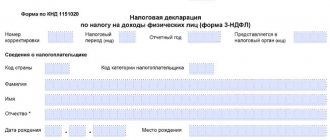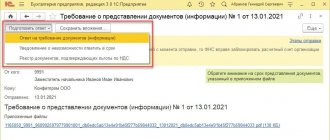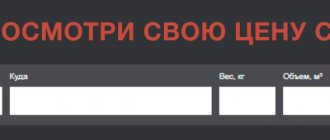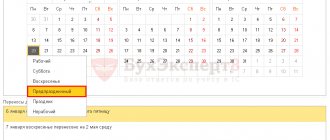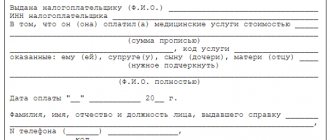Documents to confirm travel expenses
The deduction for travel and entertainment expenses is established in clause 7 of Art. 171 Tax Code of the Russian Federation. The scope of travel expenses for which a taxpayer can apply a deduction is limited. This:
- expenses for travel to and from the place of business travel (including expenses for the use of bedding on trains);
- expenses for renting residential premises.
Documentary evidence of travel expenses are:
- an order to send an employee on a business trip for a certain period of time;
- the employee’s advance report on the amounts spent on a business trip, approved by the head of the organization;
- documents attached to the advance report (on the rental of residential premises, travel documents);
- other documents.
Should VAT be charged on daily allowances?
When signing the KS-3 form, we had a disagreement with the Customer regarding the calculation of VAT. The facility is being built using the method of sending workers.
The customer refuses to include the cost of paying per diem in the total amount of “other” costs, since he believes that VAT should not be charged on per diem. Is the Customer right?
Answer
This issue is more related to the field of accounting. But it can be answered based on regulatory and methodological documents on pricing in construction.
In accordance with clause 4. 100 “Methods for determining the cost of construction products on the territory of the Russian Federation” MDS 81-35.2004:
“The amount of funds for the payment of VAT is accepted in the amount established by the legislation of the Russian Federation, from the final data for the consolidated estimate for construction and is shown in a separate line (in columns 4-8) under the name “Funds to cover the costs of paying VAT.”
The tax base for VAT in relation to contract work performed under contracts is determined based on the estimated cost of construction, formed taking into account “other” costs, i.e. expenses for sending workers during the construction period are included in the cost of construction products and are subject to VAT on a general basis.
Below is the position of the Russian Ministry of Finance on such issues:
“In connection with the letter regarding the application of value added tax in relation to funds received by the organization for reimbursement of expenses for railway tickets, hotel accommodation, as well as for meals for business travelers,
not included in the price of the contract and incurred in connection with the execution of the contract, the Department of Tax and Customs Tariff Policy reports.
In accordance with subparagraph 1 of paragraph 1 of Article 146 of the Tax Code of the Russian Federation (hereinafter referred to as the Code), the object of taxation of value added tax is the sale of goods (work, services) and the transfer of property rights.
Based on subparagraph 2 of paragraph 1 of Article 162 of the Code, the tax base for value added tax is increased by the amount of money received for sold goods (work, services) to increase income or otherwise related to payment for sold goods (work, services).
In our opinion, reimbursement by the customer of expenses incurred by the organization in connection with its execution of the contract for paid services is associated with payment for the services provided by the organization to the customer.
Taking into account the above, these funds are subject to inclusion in the tax base for value added tax and, on the basis of paragraph 4 of Article 164 of the Code, upon receipt of them, the tax should be calculated at the calculated rate of 18/118. At the same time, amounts of value added tax on the organization’s expenses on railway tickets, hotel reservations and meals for business travelers are subject to deductions in the generally established manner.”
(extract from the letter of the Ministry of Finance of the Russian Federation dated April 22, 2015 No. 03-07-11/22989)
“In connection with the letter regarding the application of value added tax in relation to funds received by an organization supplying equipment, performing installation and commissioning work, for reimbursement of travel, transportation and insurance expenses not included in the contract price and incurred in connection with the execution agreement, the Department of Tax and Customs Tariff Policy reports.
In our opinion, reimbursement by the customer of expenses incurred by the organization in connection with its execution of the contract for the supply of equipment, installation and commissioning work is associated with payment for goods (work) sold by the organization to the customer.
Taking into account the above, these funds are subject to inclusion in the tax base for value added tax and on the basis of clause 4 of Art. 164 of the Code, upon receipt, the tax should be calculated at the calculated rate of 18/118. At the same time, amounts of value added tax on the organization’s expenses for business trips and transportation expenses are subject to deductions in the generally established manner.”
(extract from letter of the Ministry of Finance of the Russian Federation dated August 15, 2012 No. 03-07-11/300)
Invoice or BSO
The basis for receiving a deduction for travel expenses is either an invoice or a strict reporting form (SRF), in which the tax amount is highlighted as a separate line.
Read on topic:
VAT deduction without invoice
If an organization purchases travel documents and hotel services for its employee in advance, it pays in cash. In this case, both the carrier and the organization providing accommodation services (VAT payer) issue invoices in which the tax amount is allocated separately, and in such situations, as a rule, there are no problems with deductions.
Travel tickets
The employee reflects these documents in his business trip report. Regarding transportation costs, you must provide a transportation document and a cash receipt.
Read on topic:
Take-off and landing expenses for business trips
It should be taken into account that according to clause 5.8 of Art. 1.2 of Law No. 54-FZ, details of a cash receipt (CSR) may be included in the travel ticket form. These include: a QR code or the date and time of the calculation, the serial number of the fiscal document, the sign of the calculation and its amount, the serial number of the fiscal drive and the fiscal sign of the document.
That is, the buyer may be issued a travel document form without a “classic” receipt. Such a check is equivalent to a regular check, so the employee has the right to print it out and present it to the employer to confirm his business trip expenses. If for some reason it is not possible to print a QR code, then all six of the above details of the cash receipt must be reflected on the ticket form, or the buyer should be issued a regular cash receipt.
What documents confirm the deduction of VAT on housing costs for a business traveler?
The Ministry of Finance explained what documents justify the deduction of VAT on expenses for services for renting residential premises during a business trip.
In its letter dated 02/26/2020 No. 03-07-09/13555, the department notes that Article 172 of the Tax Code of the Russian Federation prescribes the deduction of VAT on the basis of invoices issued by sellers when selling goods (works, services), or on the basis of other documents , including in the case of making the specified expenses for renting residential premises during a business trip.
The rules for maintaining a purchase book, approved by Decree of the Government of the Russian Federation dated December 26, 2011 No. 1137, establish that when purchasing services for renting residential premises on a business trip, completed strict reporting forms or copies thereof are registered in the purchase book. In such BSO, the VAT amount must be highlighted as a separate line.
Thus, the basis for deducting VAT when purchasing services for renting residential premises during a business trip is an invoice and documents confirming the actual payment of tax (including a cash receipt with the VAT amount highlighted in it), or a BSO issued to the business traveler and included in his trip report.
In this case, only a cash receipt is not a basis for deducting the specified amounts of VAT and is not subject to registration in the purchase book.
BUKHPROSVET
As a general rule, VAT is deducted on the basis of an invoice received from the seller. An invoice can be prepared and issued on paper or electronically. Invoices are drawn up in electronic form by mutual agreement of the parties to the transaction and if the counterparties have compatible technical capabilities to receive and process these invoices.
The invoice must indicate the serial number and date of issue. The invoice must also indicate the name of the goods and property rights, their value, information about the seller and buyer, the tax rate and the amount of tax charged to the buyer. If the invoice is missing any essential information, the buyer will not be able to receive the deduction. Formal violations of the procedure for drawing up an invoice do not entail any tax consequences.
Invoices are issued by sellers no later than 5 calendar days, counting from the day of shipment of goods (performance of work, provision of services). In some cases, a VAT deduction can be provided on the basis of documents confirming the actual payment of tax amounts when importing goods into Russia and documents confirming the payment of VAT amounts withheld by tax agents.
Business travel and income tax. What can you consider?
Business travel expenses for income tax purposes in accordance with paragraph 12 of Article 264 of the Tax Code are classified as other expenses associated with production and (or) sales. The law allows the inclusion of travel expenses for the employee’s travel to and from the place of business trip, accommodation expenses, daily allowance or field allowance, and other expenses incurred by the employee with the permission or knowledge of the company and having economic justification.
Subscribe to the magazine “Calculation” or “Calculation. Premium" for the 2nd half of 2022!
The payment procedure, as well as the amount of reimbursement of expenses associated with business trips, are determined by local acts of the organization or a collective agreement.
We also note that if an employee has lost the original travel documents, including, for example, a boarding pass, travel expenses can be confirmed with other documents, such as: a duplicate ticket; its copy remaining with the transport organization; a certificate from the transport organization indicating the details allowing to identify the individual, the route, the cost of the ticket and the date of the trip.
Daily allowance expenses
When calculating income tax, the entire amount of daily allowance paid to an employee can be included in expenses without restrictions. However, it should be remembered that there is a standardization of daily allowances for calculating personal income tax (clause 1 of Article 217 of the Tax Code of the Russian Federation): no more than 700 rubles for each day of a business trip within the Russian Federation and no more than 2,500 rubles for each day of a business trip outside our country .
Employees are paid per diem for each day they are on a business trip, including weekends and holidays, as well as for all days en route (including the day of departure and return).
The most difficult aspect of accounting is the calculation of daily allowances when sending an employee abroad. When traveling abroad, money can be paid both in rubles and in foreign currency. Daily allowances for the day of departure from Russia are paid according to the norms for business trips abroad, and for the day of entry into the Russian Federation - according to the norms for Russia. In the case of a one-day business trip abroad, the daily allowance must be calculated in the amount of 50% of the norm for business trips abroad.
It is interesting that if an employee was sent on a business trip abroad, but was not released at the time of crossing the state border, for example, due to restrictions imposed by bailiffs, then previously paid daily allowances cannot only be taken into account as part of tax expenses, but also withheld employee.
Money paid to an employee is not subject to repayment, since it is not remuneration for work, does not relate to wages, but is of a compensatory nature.
Travel expenses
Travel expenses include the following expenses: the cost of a ticket for public transport (airplane, train, etc.), the cost of services for issuing travel tickets, the cost of paying for bedding on trains, as well as the cost of travel to the place (station , marina, airport) departure on a business trip (or return), if it is located outside the locality where the employee works.
The company also has the right to specify in the regulations on business trips what class of comfort certain employees are entitled to when sent on a business trip. In this case, the organization will have the right to include in its expenses tickets at the business class fare; for example, this was previously reported by the Russian Ministry of Finance in letter dated April 21, 2006 No. 03-03-04/2/114.
More on the topic:
Salary, contributions, travel allowances: what can be taken into account in the initial cost of the operating system?
During a work trip, the employee was involved in an accident. Will this be a work injury?
Expenses for VIP service on a business trip will reduce income tax
If an employee goes on a business trip by rail in a luxury carriage, additional services may be included in the ticket price, according to the Russian Ministry of Finance, the cost of such services can also be taken into account by the organization when calculating income tax, financiers expressed their opinion in a letter dated June 19 2022 No. 03-03-06/1/37945. Please note: the cost of services is not included in the employee’s income subject to personal income tax. Moreover, if the price of food is shown as a separate line on the ticket, these costs are not taken into account for profit tax purposes.
In addition, organizations can include in the expenses that reduce profit the cost of chartering an aircraft on which the employee traveled to and from the business trip, as well as the cost of paying for the services of a luxury lounge equipped with additional means of communication, this was also previously reported The Ministry of Finance of Russia, in particular in letter dated June 7, 2007 No. 03-03-06/1/365.
To the departure point
As we mentioned above, the organization has the right to take into account the costs of travel to the station, airport, employee’s home, as well as to the place of his permanent work during the period of a business trip, while the type of transport that can be used is not specified in the Tax Code, thus , this may include taking a taxi. And if everything is more or less clear regarding travel, for example, to the airport, then can the organization include some other taxi trips (at night, to partners’ offices, etc.) as part of travel expenses?
Opinion of the Ministry of Finance of Russia - taxi fares can be taken into account as part of tax expenses, provided they are documented and economically justified (letter dated March 25, 2020 No. 03-03-07/23568), that is, if you can justify them, for example, a work schedule that makes it difficult to use public transport, or the distance of the workplace or place of temporary residence from public transport stops, then taxi costs can be taken into account in tax expenses.
Spending on public transport
In addition, the employer has the right to provide for reimbursement of expenses for travel by public transport and establish the corresponding provisions in the collective agreement or other LNA. With this option, expenses for travel by public transport within the city while the employee is on a business trip, in the opinion of the Ministry of Finance of Russia, expressed in letter No. 03-03-06/4/80 dated July 21, 2011, can be taken into account for tax purposes profits of organizations.
Car rental expenses
Renting a car on a business trip has recently become an increasingly popular way of transportation. And here the approach to accounting for expenses is similar to the above: if such a possibility is specified in the local regulations of the organization, expenses for renting a car are documented and economically justified.
Documentary proof of travel
Travel expenses are taken into account for profit tax purposes in the amount of actual expenses incurred, confirmed by primary documents. Let’s take a closer look at what documents can be used to confirm certain travel expenses.
| Tickets | itinerary receipt, control coupon of an electronic travel ticket, air or train ticket; boarding pass with security check for airline tickets; cash receipt (including electronic) of purchase |
| Taxi | cash receipt; route information; work order for the provision of a vehicle for the transportation of passengers and luggage (if available) |
| Public transport | a ticket containing the mandatory details given in Appendix No. 1 to the Rules for the Transportation of Passengers and Baggage |
| Car rent | vehicle rental agreement; cash receipt confirming payment; documents confirming the use of a rented car while on a business trip |
Living expenses
The procedure for payment and norms for living expenses, similar to other travel expenses, are established by the organization in its LNA. Just like other company expenses, in order to be taken into account when calculating taxes, living expenses must be economically justified and documented.
The cost of additional services provided by hotels is included in expenses and can be taken into account as travel expenses. The exceptions are expenses such as expenses for servicing an employee in bars and restaurants, expenses for using recreational and health facilities, and the cost of room service.
Booking costs and resort fees
Payment for reservation services can be regarded as an additional service provided by the hotel, so it can be included in travel and tax expenses. By the way, the amount of the paid resort fee on a business trip also reduces taxable income.
Documentary proof of residence
Since employees can stay during a business trip not only in a hotel, but also, for example, rent an apartment, the issue of proper documentation is very relevant. We'll tell you what documents you need to collect.
| Hotel accommodation | cash receipt; hotel bill or deed |
| Renting an apartment from an individual | lease contract; payment documents, for example, receipt of money. Please note that when renting an apartment from an individual, documents confirming the landlord's ownership of the rented apartment are not needed to justify living expenses |
| Hotel booking through booking.com and other similar resources | document confirming the use of the employee’s card - account statement; a document confirming payment for hotel services and receipt of money by the hotel |
Other expenses
Other travel expenses may include costs for processing and issuing visas and international passports. Costs for visas include state fees, consular fees, and payment for services of companies providing document processing services. Please note that the costs of processing and issuing visas are taken into account as part of tax expenses only if a business trip has taken place, as reported by the Russian Ministry of Finance in letter dated May 6, 2006 No. 03-03-04/2/134.
Consular, airport fees, fees for the right of entry, transit can also be taken into account when calculating taxes. As well as communication services - mail, telegraph, telephone, Internet - expenses for transportation and storage of luggage, expenses for meetings with partners, entertainment expenses, purchasing medical insurance while an employee is on a business trip (provided that it is a mandatory condition for issuing entry visa).
We should not forget that other travel expenses and the above additional costs must also be provided for by the company’s LNA and documented.
In conclusion, we add to the above that, in the opinion of tax authorities, the absence of a result in the form of concluded contracts or other signed documents does not indicate the non-productive nature of travel expenses (letter of the Federal Tax Service for Moscow dated August 11, 2009 No. 16-15/082607.2).
Thus, even if after a business trip the employee has not achieved any obvious positive results, if properly registered, the organization can take into account the expenses for the business trip when calculating income tax.
Stay up to date with the latest changes in accounting and taxation! Subscribe to Our news in Yandex Zen!
Subscribe
Accounting for travel expenses for tax purposes in questions and answers
Elena Strokova,
chief expert consultant of the Client Training Department of TLS-PRAVO LLC Most organizations in their activities are faced with the need to send their employees on business trips. Current legislation contains certain requirements for the procedure for registering business trips, paying for travel expenses and accounting for them for tax purposes. However, questions regarding travel expenses are not decreasing. We will answer the most relevant ones.
Additional hotel services should be determined by the production focus
An employee of an organization on a business trip rented a hotel safe.
These services are highlighted separately in the hotel's payment documents. Does an organization have the right to take such expenses into account as travel expenses when calculating income tax? Are the expenses of a business traveler for renting a safe in a hotel subject to personal income tax? In accordance with Art. 168 of the Labor Code of the Russian Federation, in the event of being sent on a business trip, the employer is obliged to reimburse the employee, including the costs of renting residential premises and other expenses incurred by the employee with the permission or knowledge of the employer.
The composition of expenses taken into account for profit tax purposes as travel expenses is defined in paragraphs. 12 clause 1 art. 264 of the Tax Code of the Russian Federation, which includes, among other things, the costs of renting residential premises.
Under this item of expenses, employee expenses for additional services provided in hotels are also subject to reimbursement, with the exception of expenses for service in bars and restaurants, expenses for room service, expenses for the use of recreational and health facilities (Letter of the Ministry of Finance of the Russian Federation dated December 5, 2011 No. 03 -03-06/1/802).
At the same time, like other expenses for accounting for income tax, the costs of paying for additional hotel services must not only be documented and economically justified, but also incurred to carry out activities aimed at generating income (clause 1 of Article 252 of the Tax Code of the Russian Federation ). The procedure and amount of reimbursement of expenses related to business trips are determined by a collective agreement or local regulations of the organization. For example, regulations on business trips.
Thus, an organization has the right to take into account, when calculating income tax, expenses for paid services in a hotel, in particular for renting a safe, but subject to their production focus (Letter of the Ministry of Finance of Russia dated May 23, 2013 No. 03-03-06/1/18308). For example, a hotel safe was used by an employee to store important organizational documents that he needed to complete a task on a business trip.
At the same time, it should be noted that according to paragraph 3 of Art. 217 of the Tax Code of the Russian Federation are not subject to personal income tax on all types of compensation payments established by the current legislation of the Russian Federation (within the limits established in accordance with the legislation of the Russian Federation), related, in particular, to the performance of work duties by the taxpayer (including reimbursement of travel expenses).
The list of business trip expenses, the reimbursement amounts of which are not subject to taxation, is contained in paragraph. 12 clause 3 art. 217 Tax Code of the Russian Federation. For the amount of payment for the cost of services for renting a safe for a posted employee, the specified provisions of clause 3 of Art. 217 of the Tax Code of the Russian Federation do not apply. Consequently, the amount of payment for the cost of paid services provided by the hotel for renting a safe for a posted employee is subject to personal income tax (Letter of the Ministry of Finance of Russia dated May 23, 2013 No. 03-03-06/1/18308).
The organization's expenses for renting an apartment for posted workers will be “profitable” expenses only for the period of its use
Company employees often go on business trips to the same city.
For their accommodation, the company rents an apartment from an individual. During certain periods the apartment is empty. Can rent and utility payments for these periods be taken into account as income tax expenses? If for a company such renting an apartment is cheaper than compensating business travelers for the cost of paying for a hotel, then such rental costs will be economically justified (clause 1 of Article 252 of the Tax Code of the Russian Federation) and can be taken into account when calculating income tax (clause 12 p. 1 Article 264 of the Tax Code of the Russian Federation). At the same time, as documentary evidence of these expenses, including a concluded lease agreement (sublease), documents confirming payment of lease payments and an acceptance and transfer certificate of leased property (letter of the Ministry of Finance of Russia dated November 15, 2017 No. 03-03-06/ 1/75483, dated 03/25/2019 No. 03-03-06/1/20067).
In addition, the tenant’s responsibilities include bearing the costs of maintaining the leased property, unless otherwise established by the lease agreement (Clause 2 of Article 616 of the Civil Code of the Russian Federation). Consequently, the cost of paying utilities for a rented apartment will also be economically justified.
This means that both rent and utility payments can be taken into account in expenses for the entire period of the lease agreement. At the same time, the Russian Ministry of Finance believes that it is possible to take into account the costs of renting such an apartment only for the period when it was actually used for the accommodation of posted workers.
According to financiers, expenses in the form of rent for the time when the premises were not used cannot be recognized for profit tax purposes (letters of the Ministry of Finance of Russia dated January 15, 2016 No. 03-03-07/803, dated March 25, 2010 No. 03-03 -06/1/178, dated 01/25/2006 No. 03-03-04/1/58). Financial department specialists also indicated that rent amounts are included in expenses on the basis of documents indirectly confirming the fact that business travelers are staying in the apartment. Such documents, for example, can be a travel certificate, travel cards, or a business trip report.
With regard to utility bills, regulatory authorities adhere to the same approach: they can be taken into account in “profitable” expenses only for the time when business travelers lived in the apartment (letter of the Ministry of Finance of Russia dated December 5, 2011 No. 03-03-06/1/802, Federal Tax Service of Russia in Moscow dated May 24, 2012 No. 16-15/ [email protected] , dated April 16, 2010 No. 16-15/ [email protected] ).
Payment documents are not required to confirm travel expenses using e-tickets.
travel expenses for travel using an electronic ticket, including an air ticket?
The organization has the right to justify the consumption of transportation services with any documents that directly or indirectly confirm the fact of use of purchased tickets (Letter of the Ministry of Finance of Russia dated July 26, 2018 No. 03-03-06/1/52555).
The costs of purchasing a railway ticket are confirmed by a control coupon of an electronic travel document (an extract from the automated control system for passenger transportation on railway transport), received electronically via the information and telecommunications network (clause 2 of Order of the Ministry of Transport of Russia dated 08/21/2012 No. 322, letters of the Ministry of Finance of Russia dated 10/15/2014 No. 03-03-07/51936, dated 08/25/2014 No. 03-03-07/42273). The costs of purchasing an air ticket are confirmed by the route/receipt of the electronic ticket and the boarding pass (clause 2 of the Order of the Ministry of Transport of Russia dated November 8, 2006 No. 134, Letter of the Federal Tax Service of Russia dated April 11, 2019 No. SD-3-3 / [email protected] ).
In this case, the boarding pass, including the electronic boarding pass received during electronic check-in for the flight, must contain the relevant details confirming the fact that the accountable person has consumed the air transportation service.
This requisite is the inspection stamp. If there is no inspection stamp on the printed electronic boarding pass, the organization must confirm the fact that the accountable person has consumed the air transportation service in another way.
If it is impossible to obtain a screening stamp on the boarding pass, the organization may submit a certificate issued by the air carrier or its representative containing the information necessary to confirm the flight (Letter of the Ministry of Finance of Russia dated February 28, 2019 No. 03-03-05/12957). When the costs of purchasing a railway and (or) air ticket are confirmed by the above documents, then for profit tax purposes, additional documents evidencing payment for the ticket, including statements of payment by bank card, are not required (Letter of the Ministry of Finance of Russia dated January 14, 2014 No. 03-03 -10/438, sent by Letter of the Federal Tax Service of Russia dated 02/05/2014 No. GD-4-3/1897).
An employee’s expenses for car sharing while on a business trip can be included in “profitable” expenses
When calculating income tax, does an organization have the right to take into account reimbursement to an employee of expenses for car sharing services on a business trip?
For the purposes of calculating income tax, car sharing costs in the form of booking and rental fees (including travel and standby) can be taken into account in other costs associated with production and sales, provided that they are economically justified and documented (clause 1 of Art. 252, paragraph 12, paragraph 1, article 264 of the Tax Code of the Russian Federation).
Documents confirming the employee’s expenses for car sharing are (letters from the Federal Tax Service of Russia for Moscow dated January 28, 2019 No. 13-11/ [email protected] , Ministry of Finance of Russia dated November 29, 2010 No. 03-03-06/1/742):
- car sharing agreement (Article 643 of the Civil Code of the Russian Federation);
- documents confirming payment for car sharing services: cash receipt or BSO, bank account statement (Clause 2, Article 1.2 Federal Law No. 54-FZ of May 22, 2003);
- documents confirming the fact of using a rented car for the purpose of fulfilling an official assignment while on a business trip. For example, a memo indicating the purpose of the trip, a detailed report from a car sharing company about the trip.
Moreover, if an organization reimburses an employee for expenses associated with his violation of the law and (or) the terms of a car sharing agreement, then such expenses are not taken into account for the purposes of calculating income tax, since they are not recognized as economically justified expenses of the organization (Clause 1 of Article 252 of the Tax Code of the Russian Federation ).
These include, for example:
- fines for violating traffic rules, for improper parking (clause 2 of article 270 of the Tax Code of the Russian Federation);
- fines for damage to the car, loss of documents, smoking in the cabin;
- expenses for evacuation and payment for special parking of a car in case of violation of parking rules.
Continuation of the article “Accounting for travel expenses for taxation in questions and answers” in the next issue of the PRAVOSovetnik magazine. You will learn how to arrange a business trip for an employee in his personal car to calculate income tax, whether compensation for interrupted vacation is subject to personal income tax and insurance premiums, and whether the costs of a business trip, in the event of not concluding a contract, can be considered economically justified and taken into account when calculating income tax .
